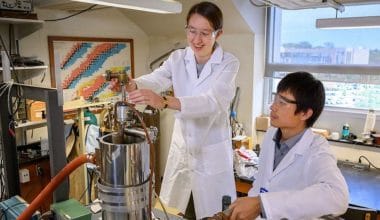Physiotherapists use a range of therapies, including massage, manipulation, stretching, and exercise, to reduce pain and speed up healing. Because accidents occur daily, there is a need for more Physiotherapists. This article will help you choose better among these best-accredited physiotherapy schools worldwide.
The major, Physiotherapy, is a very challenging but fascinating career path. Read more to learn more about physiotherapy and how you can become a professional physiotherapist.
Physiotherapists work in various fields, from intensive care and occupational health to outpatients and women’s health. The three-year university courses require much practical work to equip students for the role.
Pursuing a career in Physiotherapy is unarguably very lucrative and the job that would give you the satisfaction you desire. Relax, take your time to explore our list of top universities that offer physiotherapy degrees, information on entry requirements, the course, and the biggest advantages to studying at each institution.
Table of contents
- Brief History Of Physiotherapy
- Who is a Physiotherapist?
- How Long Does it Take to Become a Physiotherapist?
- What are the requirements to become a Physiotherapist?
- What is the Average GPA for Physiotherapy schools?
- Can You Get a Physical Therapy Degree Online?
- Physiotherapy Vs Physical Therapy
- What Is The Difference Between Physiotherapy And Physical Therapy?
- List of 13 Best Physiotherapy Schools in the world.
- #1 University of Delaware
- #2 University of Pittsburgh
- #3 University of Southern California
- #4 Washington University in St. Louis
- #5 Emory University
- #6 Northwestern University
- #7 University of Iowa
- #8 MGH Institute of Health Professions
- #9 U.S. Army-Baylor University
- #10 Duke University
- FAQs Best Physiotherapy Schools
- Conclusion
- Editor’s Recommendation
- References
Brief History Of Physiotherapy
The origin of physiotherapy or (physical therapy) as a professional group date back to Per Henrik Ling, “Father of Swedish Gymnastics,” He founded the Royal Central Institute of Gymnastics (RCIG) for manipulation and exercise in 1813.
The Swedish word for a physical therapist is sjukgymnast = someone involved in gymnastics for those who are ill. In 1887, Sweden’s National Board of Health and Welfare offered PTs official registration. Other countries followed afterward. In 1894, four nurses in Great Britain formed the Chartered Society of Physiotherapy.
The School of Physiotherapy at the University of Otago in New Zealand in 1913, and the United States 1914 Reed College in Portland, Oregon, which graduated “reconstruction aides. Since the profession’s inception, spinal manipulative therapy has been a part of the physiotherapy practice.
Modern physiotherapy was established towards the end of the 19th century because of events that influenced a global scale, which called for rapid advances in physiotherapy.
Who is a Physiotherapist?
A physiotherapist is a trained and certified medical expert with experience in diagnosing physical abnormalities, restoring physical function and mobility, maintaining physical function, and promoting physical activity and proper function.
Physiotherapists help people affected by injury, illness, or disabilities through movement and exercise, manual therapy, education, and advice.
They help maintain health for people of all ages, helping patients to manage pain and prevent disease.
What do physiotherapists do?
The profession encourages development and aids recovery, enabling people to stay at work while helping them remain independent for as long as possible.
However, the duties of a physiotherapist include the following;
- Bring wellness and mobility to physical disabilities caused by injuries, stroke, or other neurological disorders through physiotherapy treatment programs.
- Initiate appropriate physiotherapy intervention programs for patients or clients suffering from immobility.
- Assess and evaluate physical disabilities caused by neurological disorders, stroke, diseases, or injuries.
- Teach patients and their families about self-care treatment interventions.
- Consult and collaborate with consulting physicians and other medical professionals in providing physiotherapy treatments.
- Handle pain and physical problems caused by illnesses, disabilities, and injuries.
- Manage and treat patients with disabilities in-home and community care.
- Maintained and update patient records and documents.
- Provide quality physiotherapist treatment to the highest possible levels.
- Collaborate with multidisciplinary teams to provide patient care and comfort.
How Long Does it Take to Become a Physiotherapist?
To commence your career as a physiotherapist, you must obtain some appreciable training. You must earn a Doctor of Physiotherapy (DPT) degree and pass the licensing examination.
Pursuing a career as a physiotherapist would require about 4 years, with only 150 hours of volunteer within a physiotherapy setting or hospital.
In addition to the 4 years you would acquire your bachelor’s degree, you will also spend about 3 years in a DPT program. Hence, making it about 7 years of education to become a physical therapist.
Meanwhile, some of the DPT programs are in a six-year format in which students take pre-professional courses for the first three years And then start up with the DPT courses for the second half of the program.
The duration of becoming a physiotherapist may be long, but you can certainly be sure it’s worth all the time.
See also: 30 Most Affordable Doctor of Physical Therapy (DPT) Degrees – BestMedicalDegrees.com.
What are the requirements to become a Physiotherapist?
Generally, a Physiotherapist needs basic education to complete a master’s degree program in physiotherapy. That is after you must have completed your undergraduate studies in a science-related field.
Very few undergraduate programs are specific to physiotherapy. Many university students who strive to become physiotherapists must choose a program related to science, kinesiology, exercise physiology, or biology as a specialty.
Furthermore, you must pass your state licensing exam to practice in the state.
The next step for you is to take and pass the National Physical Therapy Examination (NPTE) and the Law Exam.
To advance your career, you should also get a doctorate.
What is the Average GPA for Physiotherapy schools?
Schools may demand different grades and scores to admit students to physical therapy programs. Most schools require a minimum of 3.0 GPA, but the acceptance rate of many schools too may demand GPA scores as high as 3.75 average So it usually differs.
So, you may need to research to determine what score your dream school accepts.
Can You Get a Physical Therapy Degree Online?
Yes, you can get a lot of physiotherapy degrees online. Especially in accredited schools, provisions are made for students who desire a graduate degree in Physiotherapy.
In truth, at the Master’s degree level, very few schools offer an online graduate degree in physiotherapy. However, some colleges and universities offer online Doctorates in Physiotherapy.
There are ways that students can prepare for doctoral programs and position themselves for better study without going to the school of their choice.
The available opportunities for online Doctor of Physiotherapy Schools include direct entry and transitional programs.
While some schools offer a fully online physiotherapy degree, others use hybrid content delivery, blending in-person experience with online instruction.
The virtual classroom may be fit for topics such as medical terminology or physiology, which require in-depth study and memorization. Questionnaires and web-based exercises can aid students in assessing their knowledge, and the provision of electronic content allows them to repeat modules as necessary to reinforce their understanding of the subject.
Physiotherapy Vs Physical Therapy
Talking about physiotherapy and physical therapy, these two careers that exist separately. What is the actual difference? Sadly, the difference between the two can get pretty complicated.
However, the trouble continues when some use these two words as synonyms. Even some healthcare specialists agree that physiotherapists and physical therapists are similar occupations. While these two professions are very similar, there are still a few small variations.
Getting a straight answer regarding what sets physical therapy and physiotherapy apart is difficult. Hence, you will likely get multiple answers depending on who you ask.
So, why can’t people seem to agree on the meaning of the two? The answer is that both professions have very related job descriptions. To make things worse, the meaning of terms can vary depending on the country you’re in. For instance, the term physiotherapist is used more frequently in countries such as Ireland and Australia.
Furthermore, In these countries, a physical therapist is recognized as a position similar to a physiotherapist that requires less schooling. This means that physical therapists rank lower than physiotherapists in these regions. Therefore, this leads to a lot of confusion when people of different nationalities hear these terms.
What Is The Difference Between Physiotherapy And Physical Therapy?
Many claims that physiotherapy differs from physical therapy because it applies a more hands-on and manual procedure. These people also believe physical therapists use more exercise-based methods than physiotherapists.
To break this down, let’s cover a few major similarities. Physiotherapists and physical therapists treat patients with injuries, diseases, and disorders. The treatment methods include exercise, massages, movement, and manipulation of a patient’s trouble area.
Now, onto some differences.
There are three main types of physiotherapy: musculoskeletal, neurological, and cardiothoracic.
Musculoskeletal physiotherapy can treat problems such as sprains, back pain, muscle strains, arthritis, and posture. Physical therapists also use this form of treatment.
Neurological physiotherapy helps heal issues within the nervous system. These disorders include stroke, spinal cord injuries, and Parkinson’s disease.
Cardiothoracic physiotherapy helps patients work through asthma, bronchitis, and other cardio-respiratory-related health problems.
See also: Best Physical Therapy Schools in the World
List of 13 Best Physiotherapy Schools in the world.
Several schools worldwide offer various physical therapy programs that you would need to consider. These are the top physical therapy schools in the world. Most of them are found in the United States. Take your time and read through.
The rankings are based on the latest data from the Complete University Guide, which ranks university courses according to graduate prospects, entry standards, research quality, and student satisfaction.
Here is a List Of The Best Physiotherapy Schools in the World.
- The University of Delaware
- University of Pittsburgh
- The University of Southern California
- Washington University in St. Louis
- Emory University
- Northwestern University
- University of Iowa
- MGH Institute of Health Professions
- U.S. Army-Baylor University
- Duke University
#1 University of Delaware
Number of Programs: 8
Acceptance Rate: 66%
Graduation Rate: 94.34%
The University of Delaware has ranked Number 1 in the best physical therapy schools list.
The mission of the Department of Physiotherapy is to advance physiotherapist practice by providing outstanding entry-level and post-graduate education, translating science to deliver quality clinical services, leading federally funded rehabilitation research, and training the next generation of rehabilitation researchers and leaders of our profession.
#2 University of Pittsburgh
Number of Programs: 11
Acceptance Rate: 59%
Graduation Rate: 82%
The School of Health and Rehabilitation Sciences (SHRS) at the University of Pittsburg is among the best physiotherapy schools in the world. Hence, the school is known for its excellence in academic and clinical education and high-impact, multidisciplinary research.
The school has been leading the way to help people of all ages and stages of life to overcome movement, function, and mobility challenges.
The University of Pittsburg School of Health and Rehabilitation has been listed as the second-best accredited physiotherapy school.
#3 University of Southern California
Number of Programs: 10
Acceptance Rate: 13%
Graduation Rate: 92
The University of Southern California has been ranked as the 3rd best physiotherapist school in the world. Their three-degree programs allow graduates to choose an educational path to help them reach their goals and become leaders in the field.
Most students are enrolled in our pioneering, three-year Doctor of Physical Therapy (DPT), which is delivered in hybrid and residential formats. The school also offers one of the top programs in kinesiology — the study of the biological bases of movement, with a master’s degree and a Ph.D.
The University is leading residency programs preparing advanced practitioners in the following areas: neurological, orthopedic, pediatric, and sports physiotherapy.
#4 Washington University in St. Louis
Number of Programs: 9
Acceptance Rate: 15%
Graduation Rate: 94%
The Washington University Program in Physiotherapy is advancing human health through movement, integrating interdisciplinary research, outstanding clinical care, and education of tomorrow’s leaders to drive optimization of function across the lifespan.
Furthermore, the Program in Physiotherapy has pioneered a unique, movement-based approach to physical therapy.
Washington University physiotherapy has been ranked as the fourth-best PT school.
#5 Emory University
Number of Programs: 7
Acceptance Rate: 19%
Graduation Rate: 91%
The Department of Physiotherapy has been a destination of choice for many prospective physiotherapy students. There is something about the program that fosters exceptional skills, creativity, reflectivity, and humanity while instilling self-confidence as students transform into outstanding professionals.
The mission of the Department of Physiotherapy is to cultivate the well-being of individuals and global communities through exemplary leadership in physiotherapy education, discovery, and service.
The school is the fifth-best school for physiotherapy.
#6 Northwestern University
Number of Programs: 9
Acceptance Rate: 8%
Graduation Rate: 94%
The Department of Physiotherapy & Human Movement Sciences at Northwestern University maintains the richest possible educational environment for students to acquire training in physical therapy.
Northwestern is committed to excellent teaching, innovative research, and student’s personal and intellectual growth in a diverse academic community.
Northwestern University is the sixth-best school that offers physical therapy training.
#7 University of Iowa
Number of Programs: 6
Acceptance Rate: 84.1%
Graduation Rate: 70%
The Department of Physiotherapy and Rehabilitation Sciences has an outstanding history of success at the University of Iowa.
The Department of Physical Therapy and Rehabilitation Sciences offers a unique learning environment in a leading medical education center. The department consists of faculty members who are dedicated clinical educators and scientists who embrace the department’s mission to advance the health of humankind.
Through our faculty members’ clinical teaching skills and commitment to advancing new knowledge in physical therapy, our students are artfully mentored to meet the challenges facing health care today.
Meanwhile, in 2019 our students enjoyed a 100% first-time pass rate on the Federation of State Boards of Physiotherapy’s national licensure exam.
Moreso, The University of Iowa Doctor of Physical Therapy Program is ranked #3 among public institutions by U.S. News & World Report.
#8 MGH Institute of Health Professions
Number of Programs: 9
Acceptance Rate: 11%
Graduation Rate: 93.9%
Innovation Excellence Leadership These three words capture the department’s traditions and aspirations. These features are fixed throughout our academic and learning activities and lived by our faculty and students.
Their Doctor of Physiotherapy Program prepares physiotherapists to be successful practitioners and leaders in complex and developing healthcare systems. We maintain critical thinking and clinical decision-making, collaborative team-based care, and lifelong learning to achieve this goal.
Their Residency in Orthopaedic PT provides clinicians with a path to orthopedic specialization and excellent practice. Residents develop expertise in orthopedic practice and research by working with mentors within our clinical partnerships, Massachusetts General Hospital, Brigham and Women’s Hospital, Spaulding Rehabilitation Centers, and beyond with our exceptional community sites.
This faculty churns out leaders, innovators, and scholars. The school endeavor to prepare its students to be the best practitioners of tomorrow. Join the school in the historic Navy Yard of Boston, home to the U.S.S. Constitution and Boston Freedom Trail, and begin your journey to become tomorrow’s physiotherapist.
#9 U.S. Army-Baylor University
Number of Programs: 9
Acceptance Rate: no acceptance rate is provided for this school
Graduation Rate: 97%
The Army-Baylor University DPT program is a top-ranked physiotherapy school committed to “producing clinician-scientists and leaders of tomorrow.” Through excellence in academics and clinical education, the school selects and trains highly qualified individuals to become military physical therapists.
Since 1922, the US Army has trained physiotherapists to meet the needs of injured soldiers. In 1971, the United States Army and Baylor University partnered to establish and conduct a graduate-level physical therapy training program for the armed forces.
Since then, this program has continuously adapted to meet the physiotherapy needs of the armed forces through excellence in academic coursework, clinical education, research, and professional development of uniformed physical therapists.
#10 Duke University
Number of Programs: 12
Acceptance Rate: 84%
Graduation Rate: 100%
The Duke Doctor of Physiotherapy Program is an inclusive community of scholars engaged in the discovery, dissemination, and utilization of knowledge in the optimal care of patients and the instruction of learners.
The school’s mission is to develop the next generation of the profession’s leaders, committed to health equity and expertly prepared to integrate the best available proof in the patient-centered management of function and quality of life within a dynamic health system.
FAQs Best Physiotherapy Schools
The major difference between “Physical Therapy” and “Physiotherapy” is that physiotherapy indicates more of a hands-on manual therapy approach to rehabilitation. In contrast, physical therapy indicates a more exercise-based approach to rehabilitation. In my opinion, however, these terms are synonymous.
A Doctor of Physical Therapy or Doctor of Physiotherapy (DPT) degree is a qualifying degree in physical therapy. A DPT is a practitioner educated in many rehabilitation areas. … As of 2015, all accredited and developing physical therapist programs in the US are DPT programs.
DPT programs typically last 3 years. Many programs require a bachelor’s degree for admission and specific educational prerequisites, such as anatomy, physiology, biology, chemistry, and physics classes.
BPT, or Bachelor of Physiotherapy, is an undergraduate academic Course in Medical Science known as Physiotherapy. The BPT course duration is 4½ years, including an internship of 6 months.
Physical therapy originated as a professional group that dates back to Per Henrik Ling, known as the “father of Swedish gymnastics.” He founded the Royal Central Institute of Gymnastics in 1813 for massage, manipulation, and exercise.
Conclusion
In conclusion, Just like every other medical career, it will take you a lot of rigorous processes to become a licensed physiotherapist. However, the profession is worth all the rigors. You can be sure of a swell time in your career by acquiring your training from any of these listed best PT schools.
Editor’s Recommendation
- How Can I Become A Sports Medicine Physician? Job Details, Salary, Career
- Top 10 Dental Hygiene Schools in California
- 13 Best Animation Schools in California
- 20 Best Community Colleges in California
- 15 Best Podiatry Schools In The World | 2024 Ranking
- 21 Best Film Schools in California
- 15 Most Useless Jobs in the World that you never knew existed in 2024
- 13+ Pharmacy Schools In California
- Facts About California Scholarship Federation & Benefits
- Top 21 Scholarships for College Students in California
- 10 Best Schools for Creative Writing in the World
- Top Optometry Schools in California
- How Long Should A College Essay Be?
- Top 13 Occupational Therapy Programs in Florida
- 1 Year Masters Programs in Canada – A Guide
- Best Education Schools in the World
- 13 Best Physical Therapy Schools in California
References
DISCLOSURE: This post may contain affiliate links, meaning when you click the links and make a purchase, we receive a commission.






Comments are closed.